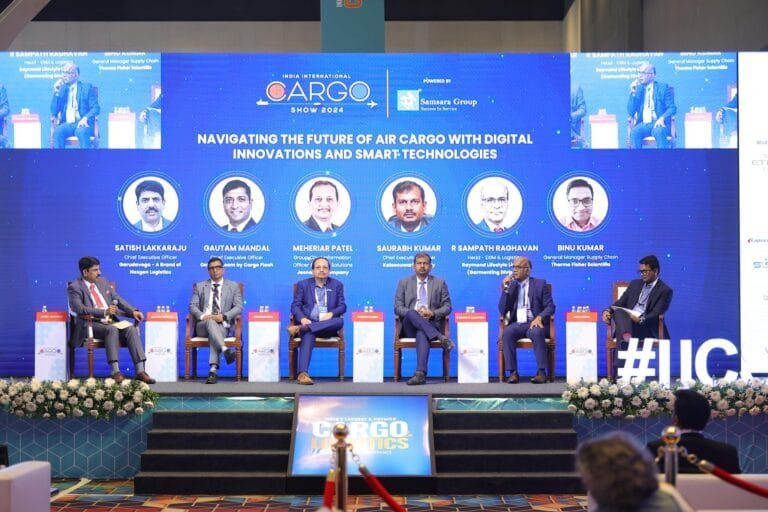As the air cargo industry adapts to the challenges of a globalised economy, digital innovations such as the Internet of Things (IoT), artificial intelligence (AI), and blockchain are emerging as transformative forces. These technologies are not only enhancing operational efficiency and security but also redefining how the industry approaches logistics, customer service, and sustainability.
Air cargo digitalisation
The adoption of digital tools has become a necessity in an industry where precision, speed, and reliability are paramount. Technologies like IoT, AI, and blockchain are enabling air cargo operators to track shipments in real-time, predict demand patterns, and ensure data integrity throughout the supply chain.
“Digital innovation is no longer a competitive advantage—it’s an operational imperative,” Satish Lakkaraju, Chief Executive Officer of Garudavega, A Brand of Nextgen Logistics, said.
“IoT sensors, for example, provide real-time updates on shipment conditions, which is critical for industries like pharmaceuticals and perishables. This level of transparency enhances trust and allows stakeholders to make informed decisions quickly.”
Enhancing predictability and efficiency
Artificial intelligence is proving to be a game-changer for the air cargo industry, particularly in demand forecasting, route optimisation, and predictive maintenance. By analysing vast amounts of data, AI algorithms can identify patterns and provide actionable insights to improve operational efficiency.
Gautam Mandal, Chief Executive Officer of Octoloop.com by Cargo Flash, highlighted the potential of AI in creating agile supply chains by adding that: “AI helps us anticipate demand fluctuations and optimise capacity utilisation. For instance, during peak seasons, AI can suggest alternative routes or carriers to avoid bottlenecks, ensuring that shipments reach their destinations on time. This capability is invaluable in a sector where delays can have significant financial and reputational impacts.”
Revolutionising transparency and security
Blockchain technology is addressing two of the most pressing challenges in air cargo—data transparency and security. By creating an immutable ledger of transactions, blockchain ensures that every step of the cargo journey is documented and accessible to authorised stakeholders.
Alanood Obaid Alsuwaidi, Senior Vice President Cargo MEAA at Menzies Aviation, spoke about blockchain’s role in building a more secure and transparent ecosystem: “Blockchain not only enhances security by reducing the risk of fraud but also fosters collaboration across the supply chain. Stakeholders can access real-time data on shipment status, documentation, and compliance, eliminating delays caused by manual processes and improving overall efficiency.”
Industry challenges
While digital innovations hold immense promise, the air cargo industry continues to grapple with challenges such as high operational costs, fragmented infrastructure, and a lack of standardisation.
Saurabh Kumar, Chief Executive Officer of Kaleesuwari Refinery, stressed the importance of addressing these issues through collaborative efforts: “Technology can only achieve its full potential if it is supported by industry-wide adoption and regulatory alignment. For instance, the standardisation of digital documentation can significantly reduce transit times and administrative burdens, benefiting all stakeholders.”
Smart technologies
For sectors such as pharmaceuticals, cold chain logistics is a critical area where smart technologies are making a significant impact.
Binu Kumar, General Manager Supply Chain at Thermo Fisher Scientific, elaborated on how IoT and AI are revolutionising this space: “Temperature-sensitive cargo requires precision monitoring to ensure product integrity. IoT sensors provide real-time data on temperature, humidity, and other critical parameters, allowing us to take corrective actions instantly if deviations occur. This level of control is transforming how we manage cold chain logistics.”
Policy and collaboration
As the air cargo industry navigates this transformative period, the role of policy and cross-sector collaboration will be critical. The adoption of digital technologies must be supported by regulatory frameworks that encourage innovation while ensuring compliance with international standards.
The future of air cargo lies in its ability to embrace change and adapt to evolving market demands. As Alsuwaidi aptly summarised,
“The air cargo industry is at a crossroads. By leveraging digital innovations and fostering collaboration, we can create a smarter, more resilient logistics ecosystem that meets the demands of a rapidly changing world.”




